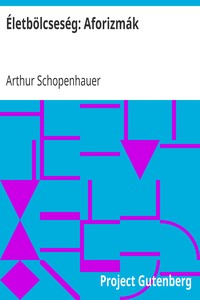Életbölcseség: Aforizmák by Arthur Schopenhauer
"Életbölcseség: Aforizmák" by Arthur Schopenhauer is a philosophical treatise written in the early 20th century. The work primarily focuses on the complexities of human happiness and the nature of existence, exploring wisdom regarding the pursuit of a fulfilling and content life. Through a series of aphorisms, the author delves into what defines a happy life, emphasizing the role of individual character over external factors like wealth or social standing. The opening of
the text introduces the concept of "életbölcseség," or life wisdom, which Schopenhauer describes as the art of making life as pleasant and happy as possible. He proposes that true happiness is rooted within ourselves and highlights how external validations and material possessions are ultimately transient and uncertain. The author sets a contemplative tone, recognizing the inherent value of individual character and inner fulfillment, stating that our inner lives are far more significant in determining true happiness than the variables of external circumstances, such as wealth and reputation. The foundation for his philosophical exploration is established here, signaling the depth of inquiry Schopenhauer intends to pursue throughout the text. (This is an automatically generated summary.)
Read or download for free
| How to read | Url | Size | |||
|---|---|---|---|---|---|
| Read now! | https://www.gutenberg.org/ebooks/64278.html.images | 464 kB | |||
| EPUB3 (E-readers incl. Send-to-Kindle) | https://www.gutenberg.org/ebooks/64278.epub3.images | 273 kB | |||
| EPUB (older E-readers) | https://www.gutenberg.org/ebooks/64278.epub.images | 275 kB | |||
| EPUB (no images, older E-readers) | https://www.gutenberg.org/ebooks/64278.epub.noimages | 258 kB | |||
| Kindle | https://www.gutenberg.org/ebooks/64278.kf8.images | 468 kB | |||
| older Kindles | https://www.gutenberg.org/ebooks/64278.kindle.images | 437 kB | |||
| Plain Text UTF-8 | https://www.gutenberg.org/ebooks/64278.txt.utf-8 | 425 kB | |||
| Download HTML (zip) | https://www.gutenberg.org/cache/epub/64278/pg64278-h.zip | 249 kB | |||
| There may be more files related to this item. | |||||
Similar Books
About this eBook
| Author | Schopenhauer, Arthur, 1788-1860 |
|---|---|
| Translator | Kelen, Ferenc, 1873-1958 |
| Uniform Title | Aphorismen zur Lebensweisheit. Hungarian |
| Title | Életbölcseség: Aforizmák |
| Credits | Albert László |
| Reading Level | Reading ease score: 60.4 (8th & 9th grade). Neither easy nor difficult to read. |
| Language | Hungarian |
| LoC Class | B: Philosophy, Psychology, Religion |
| Subject | Conduct of life |
| Subject | Maxims |
| Category | Text |
| EBook-No. | 64278 |
| Release Date | Jan 12, 2021 |
| Most Recently Updated | Oct 18, 2024 |
| Copyright Status | Public domain in the USA. |
| Downloads | 165 downloads in the last 30 days. |
| Project Gutenberg eBooks are always free! | |

